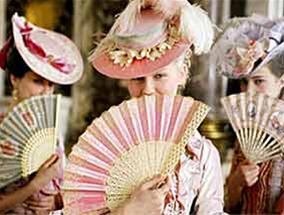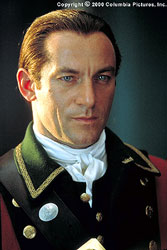 Is anyone planning to see this movie? I don't know that I'll go to the movies to see it but I'd like to see it when it comes out on HBO. I was really skeptical when I heard Kirsten Dunst was set to play the role and Sofia Coppola was directing. However, I don't think Coppola is striving for historical accuracy but rather making a film about the legend of the doomed French Queen. I don't mind historical inaccuracy as long as the author/filmmaker is not trying to push it off as history. That was a problem I had with "The Patriot." Rather than saying it was a costume drama, the filmmakers presented it as history. And it wasn't accurate. I actually liked the film, although I found myself rooting for the Redcoats. I think Jason Isaacs had a lot to do with it.
Is anyone planning to see this movie? I don't know that I'll go to the movies to see it but I'd like to see it when it comes out on HBO. I was really skeptical when I heard Kirsten Dunst was set to play the role and Sofia Coppola was directing. However, I don't think Coppola is striving for historical accuracy but rather making a film about the legend of the doomed French Queen. I don't mind historical inaccuracy as long as the author/filmmaker is not trying to push it off as history. That was a problem I had with "The Patriot." Rather than saying it was a costume drama, the filmmakers presented it as history. And it wasn't accurate. I actually liked the film, although I found myself rooting for the Redcoats. I think Jason Isaacs had a lot to do with it.  I'm the same way with books I suppose, although with books, an author has time to present the facts correctly. Maybe because I am a writer I am a tougher critic. We seem to be tougher judges on our own, I think that is pretty much true with any profession. Have you ever been out to dinner with a waitress?
I'm the same way with books I suppose, although with books, an author has time to present the facts correctly. Maybe because I am a writer I am a tougher critic. We seem to be tougher judges on our own, I think that is pretty much true with any profession. Have you ever been out to dinner with a waitress? Anyway, what do you think? Is this movie going to do a disservice to French history or will it be considered on its entertainment merits? I can't wait to see the costumes.






